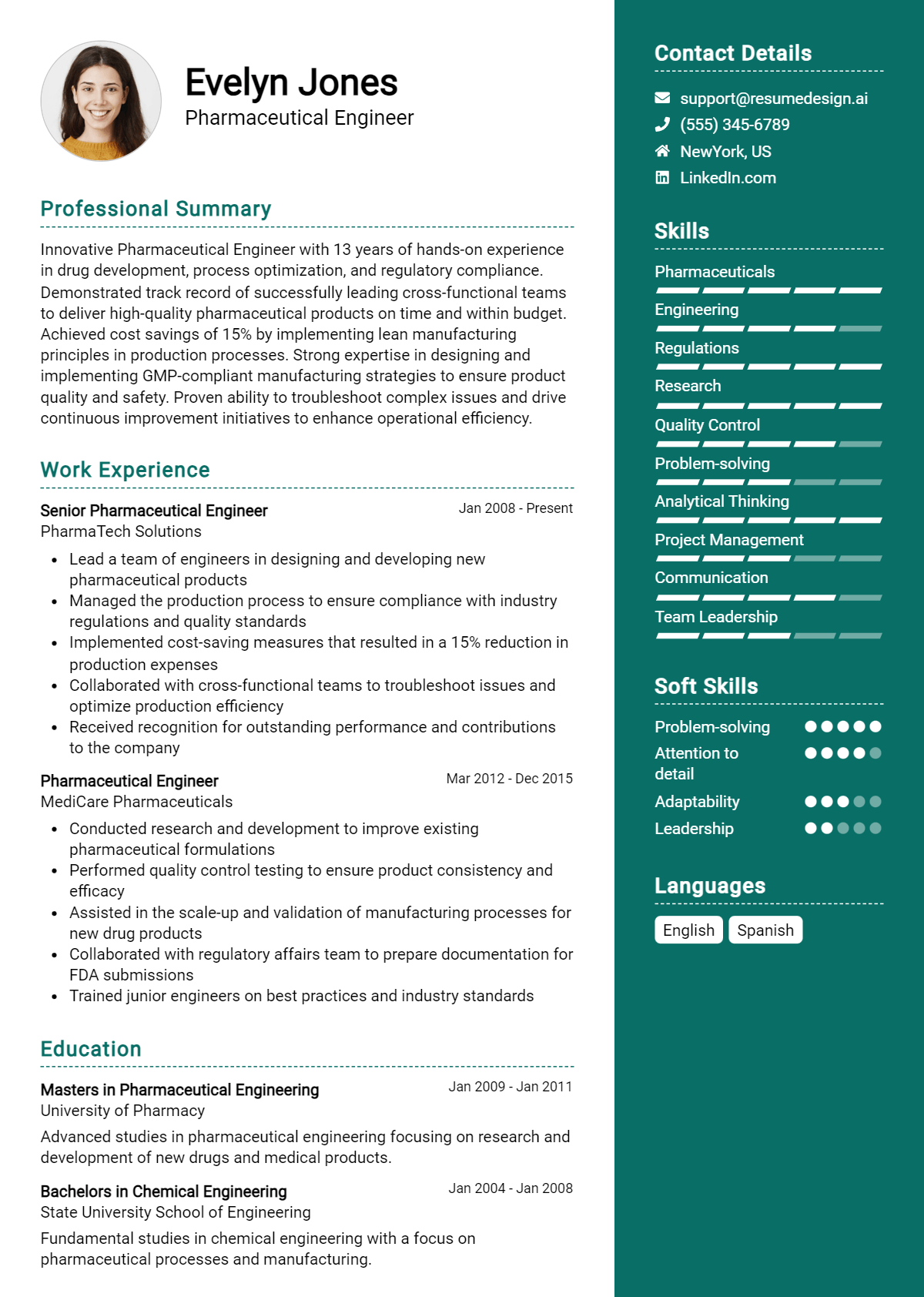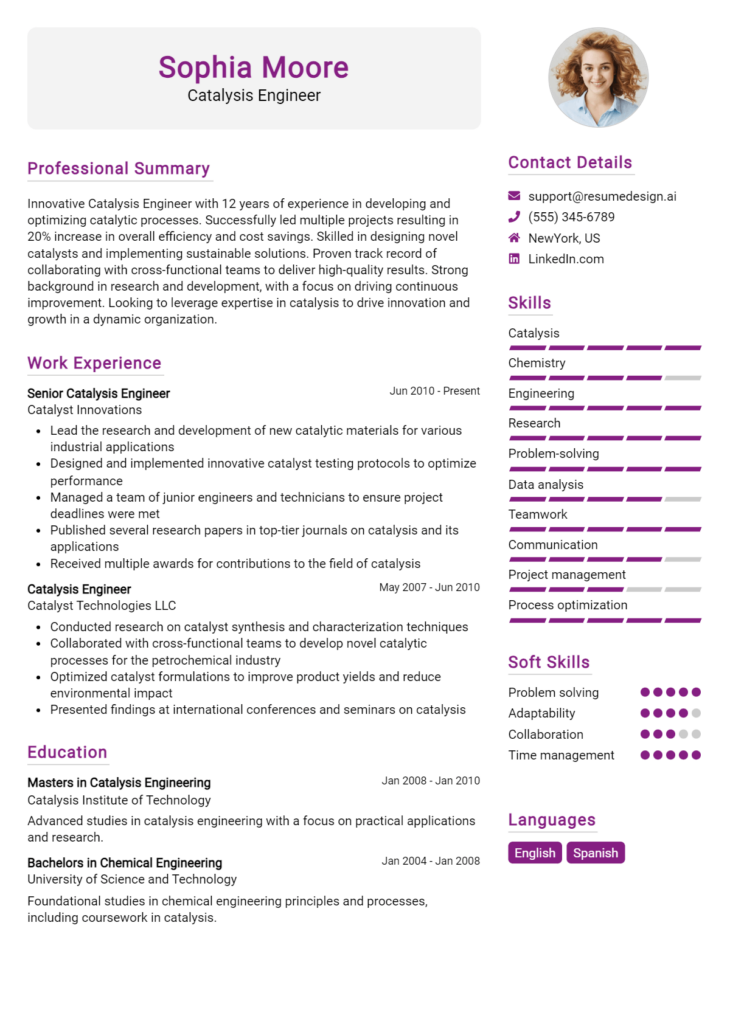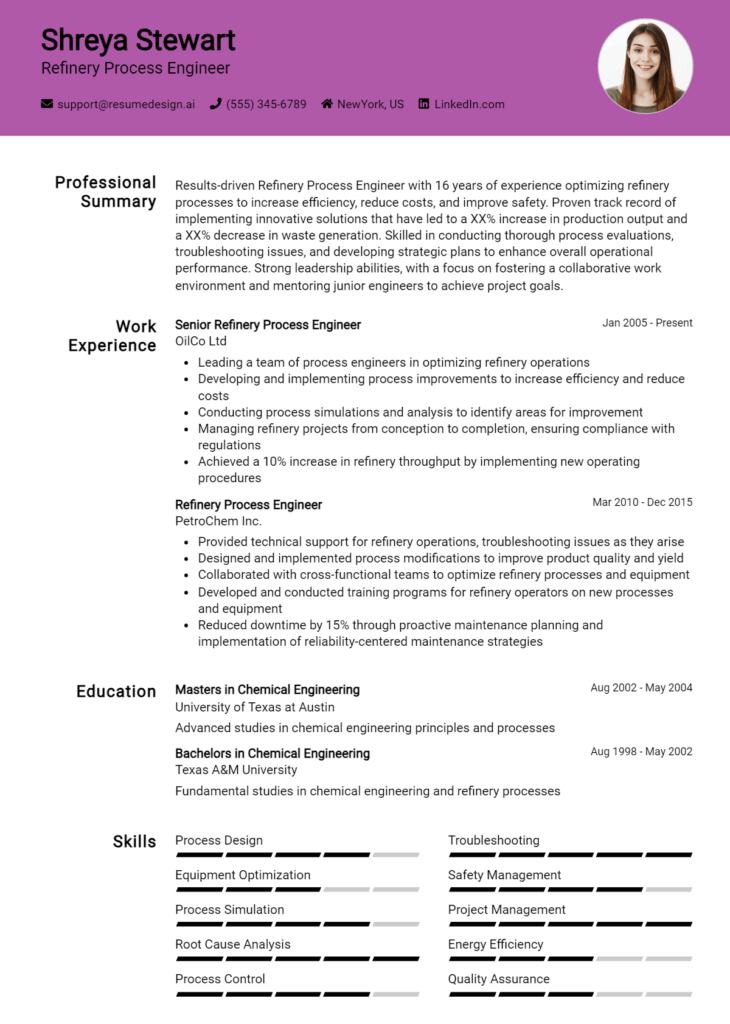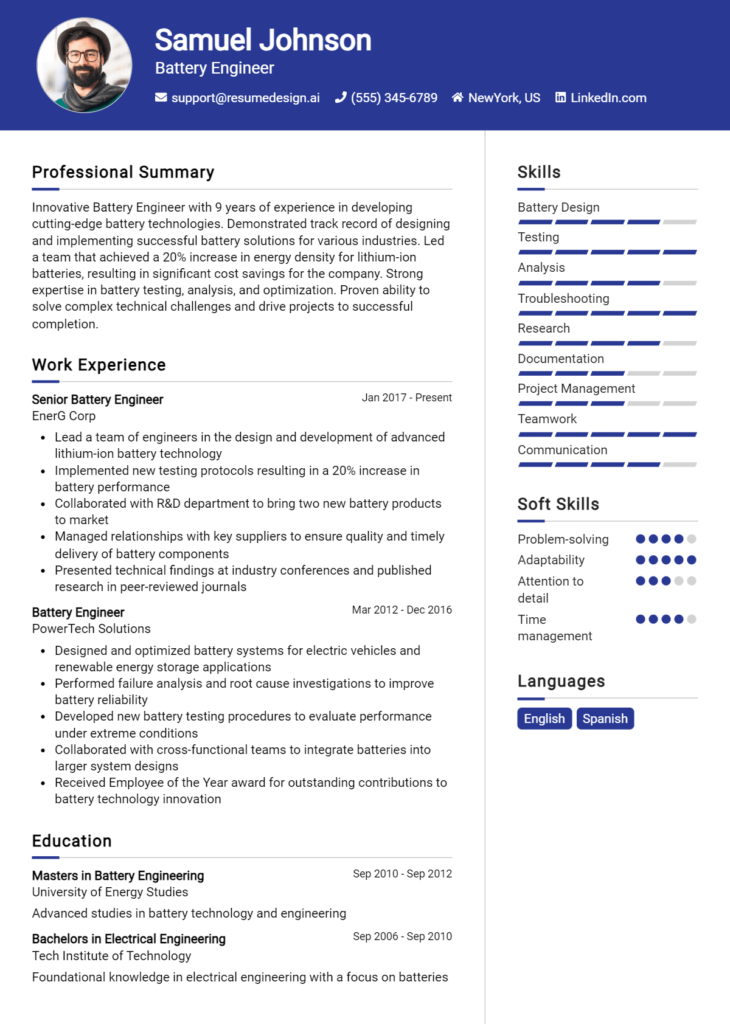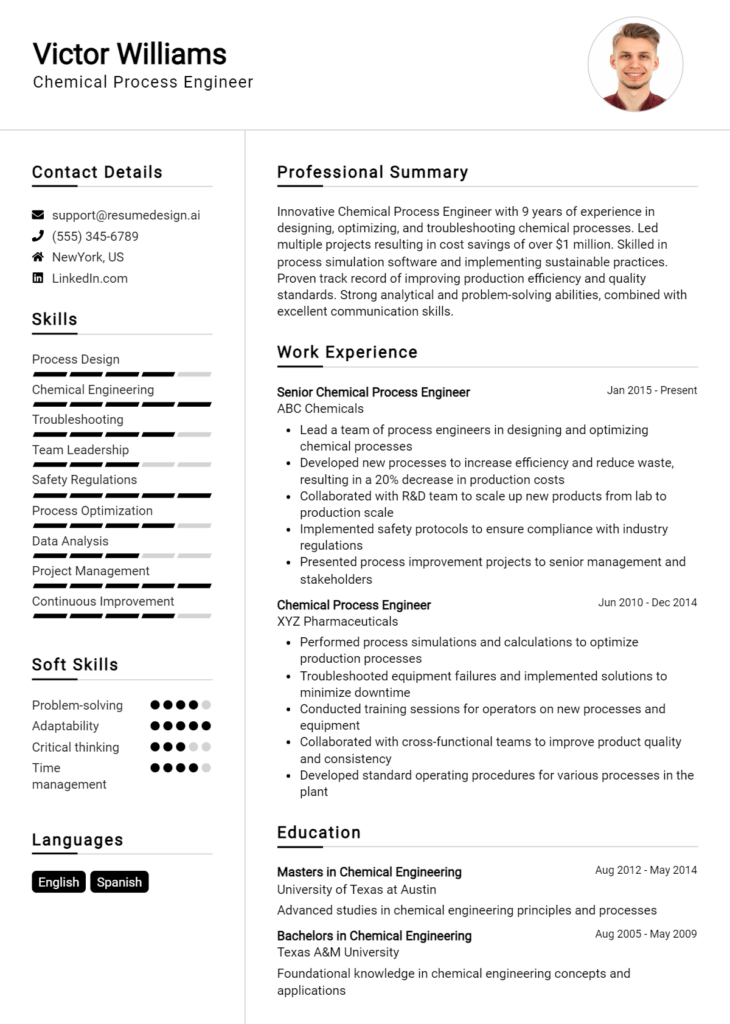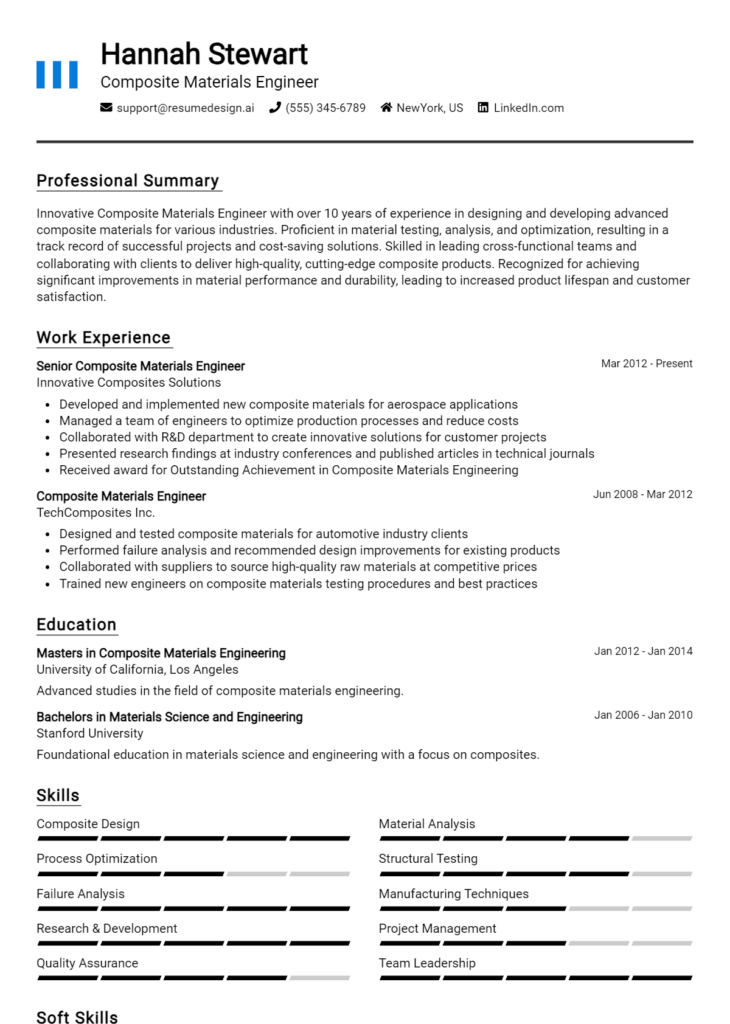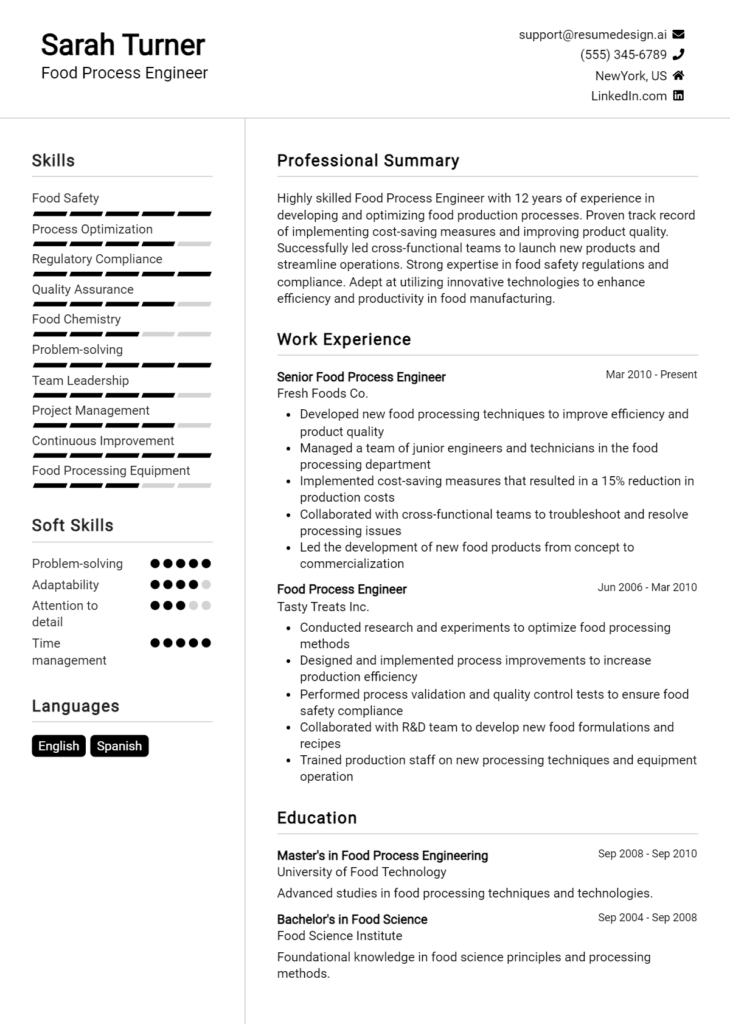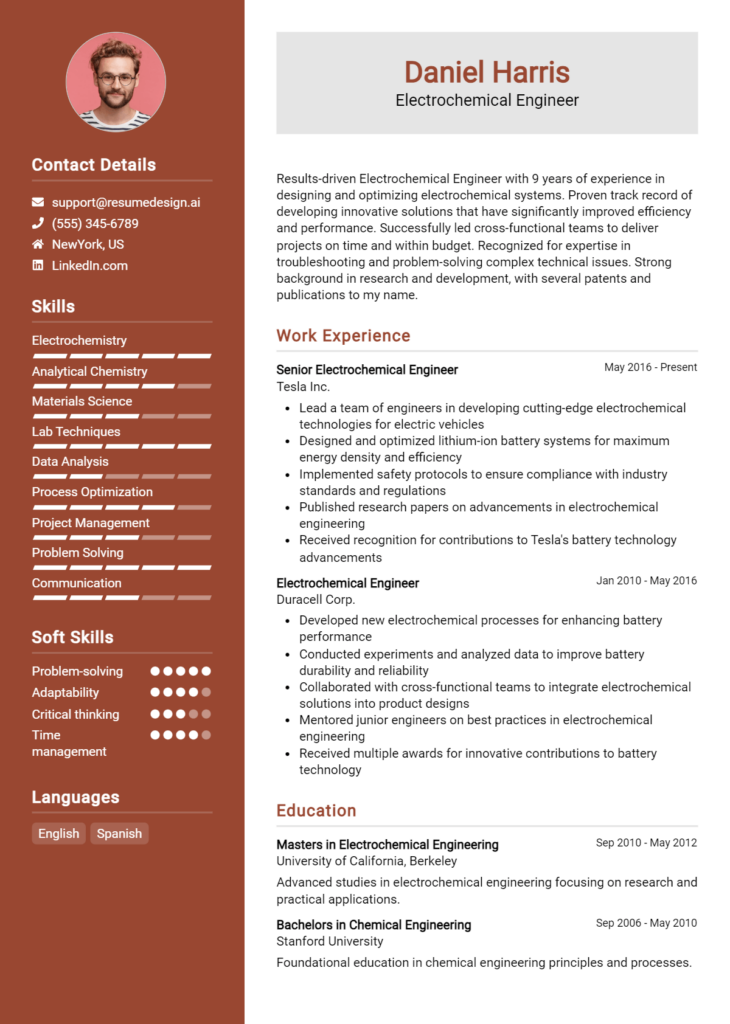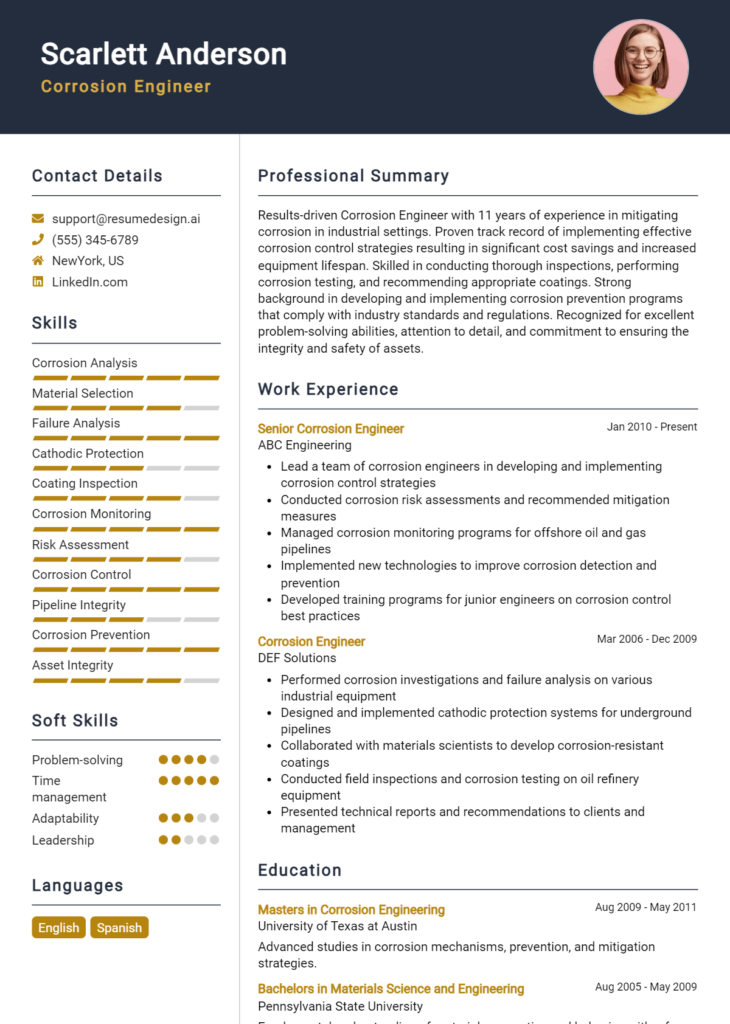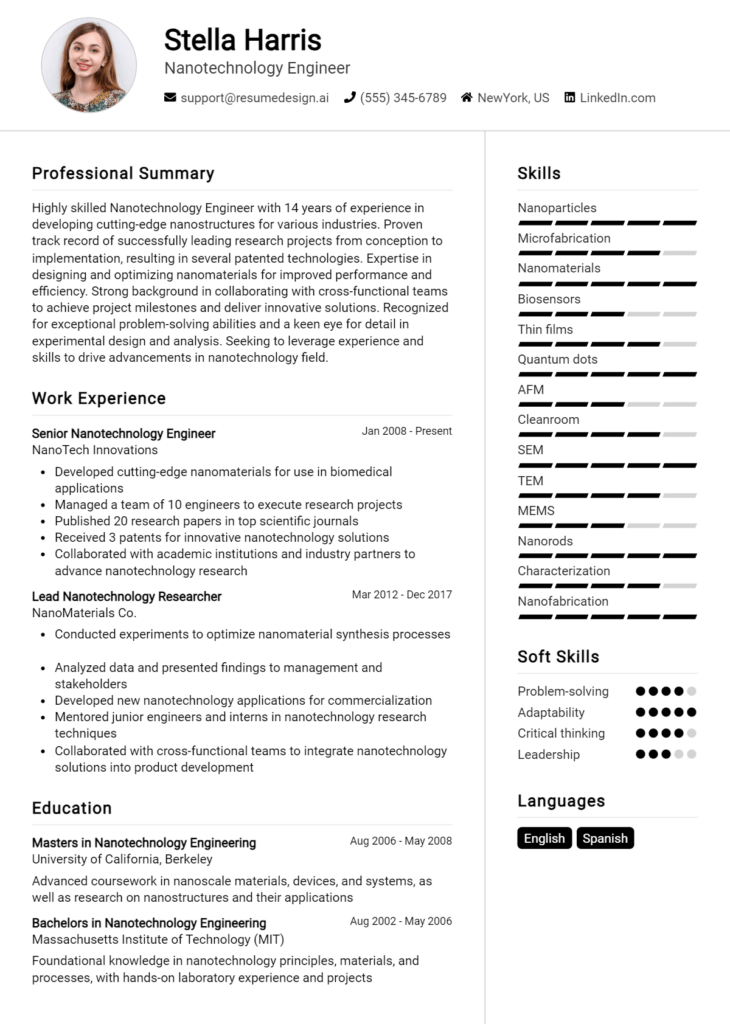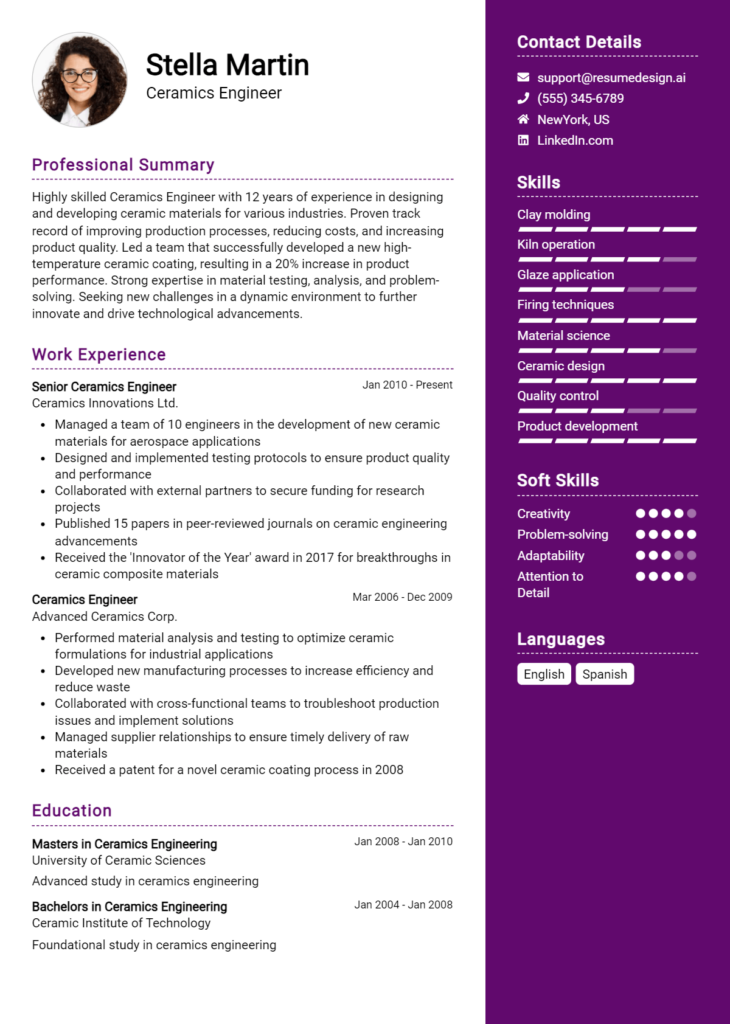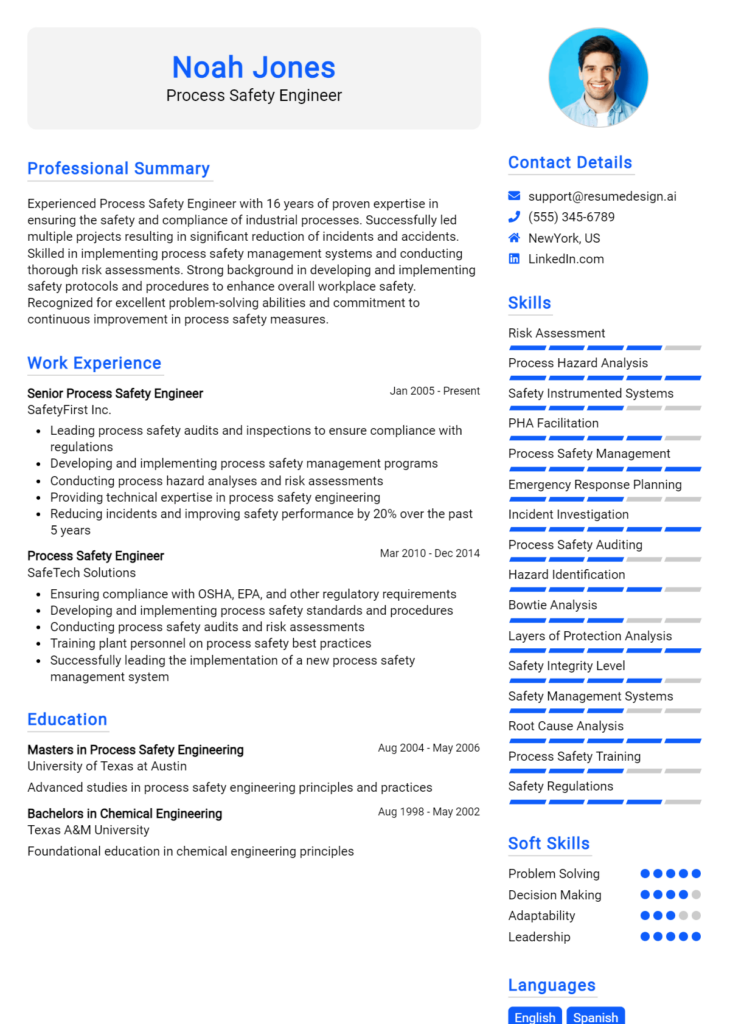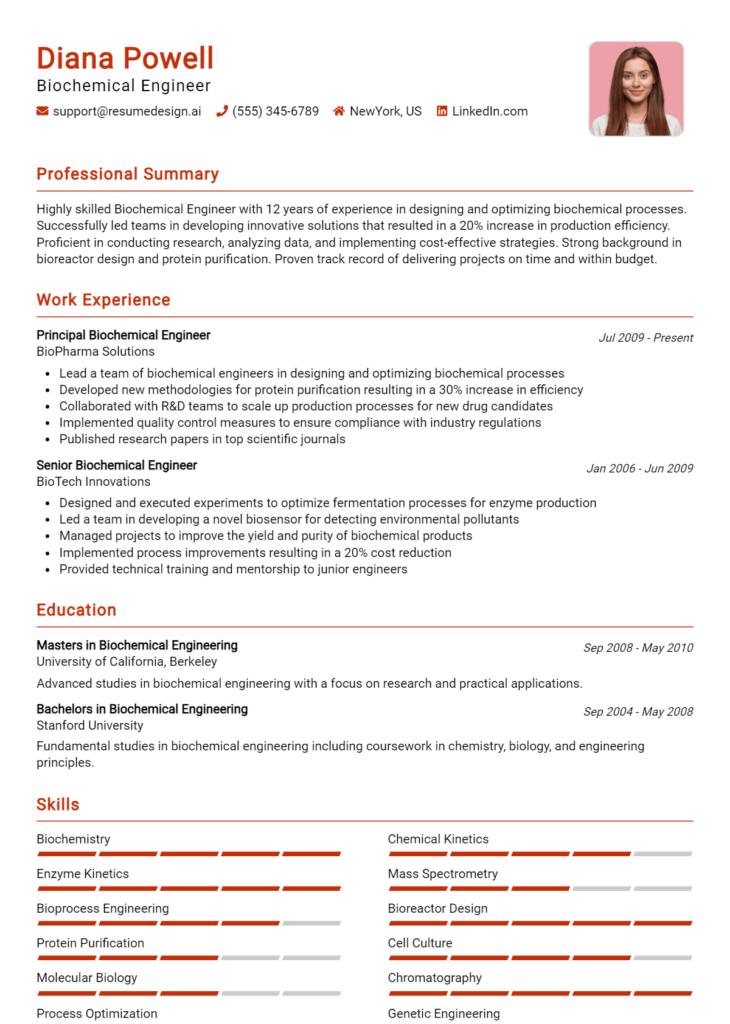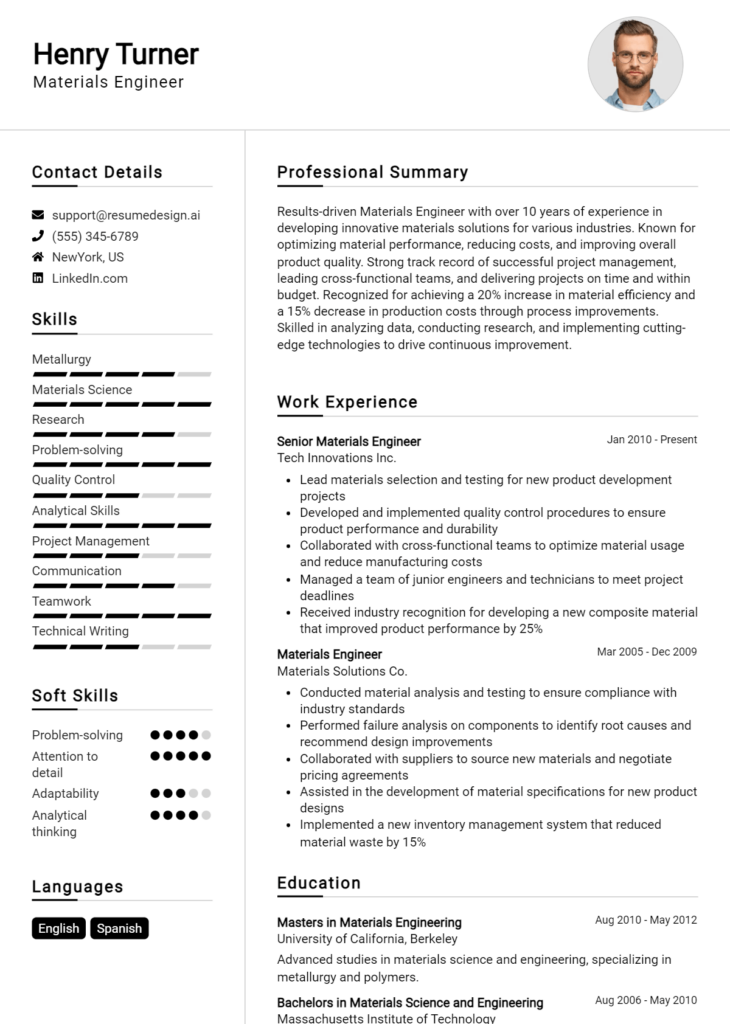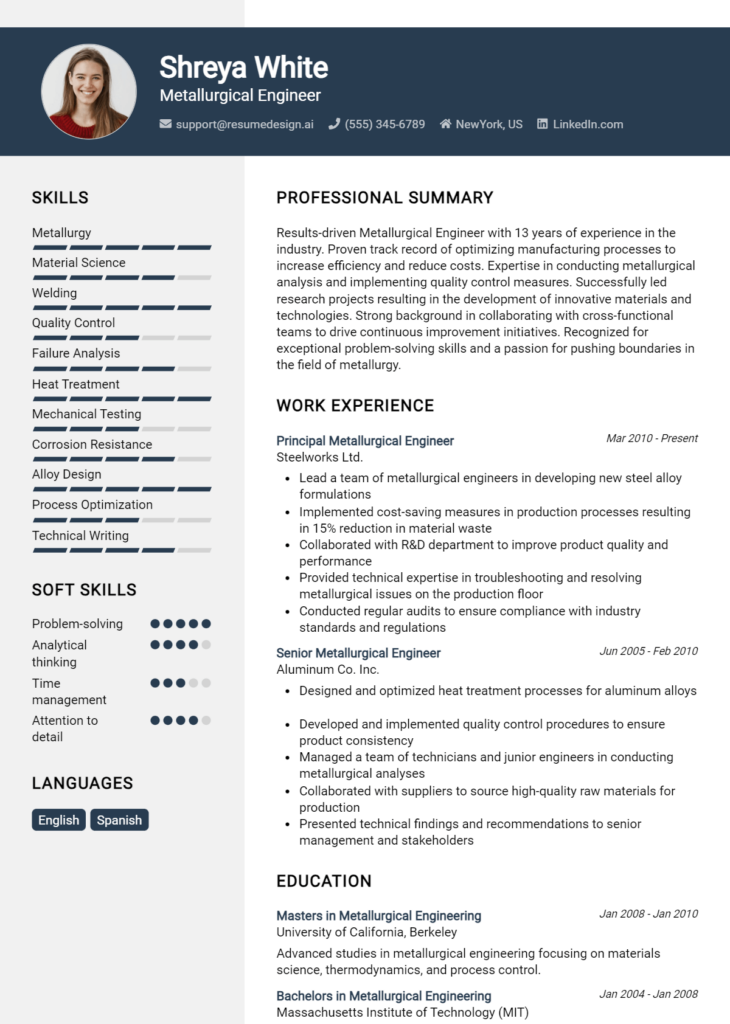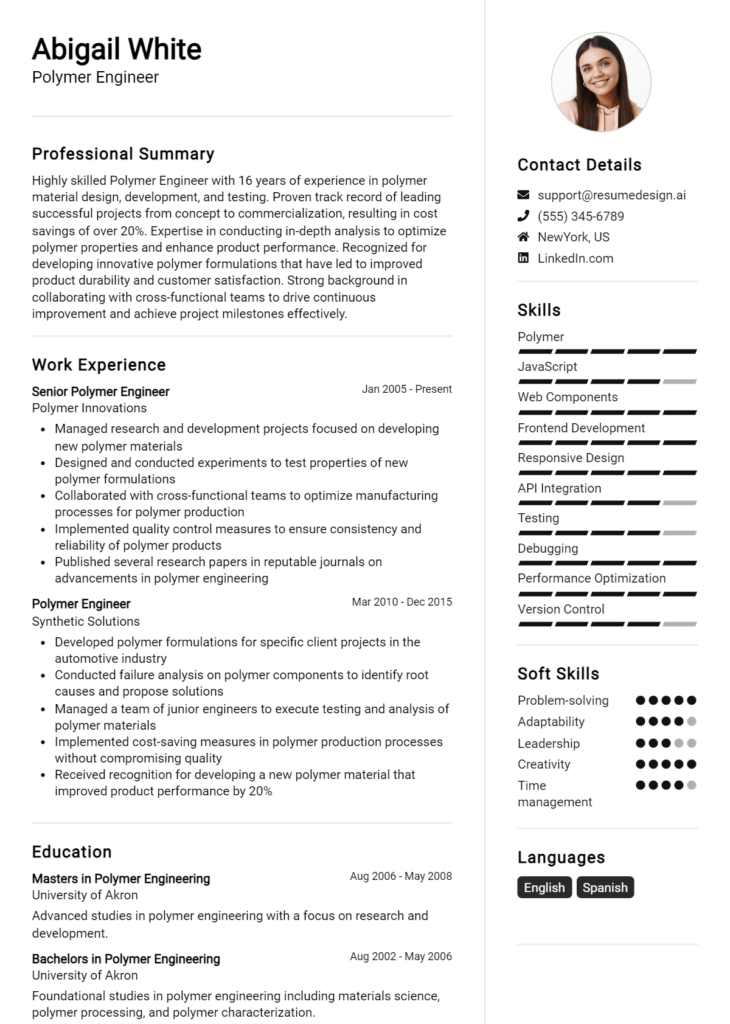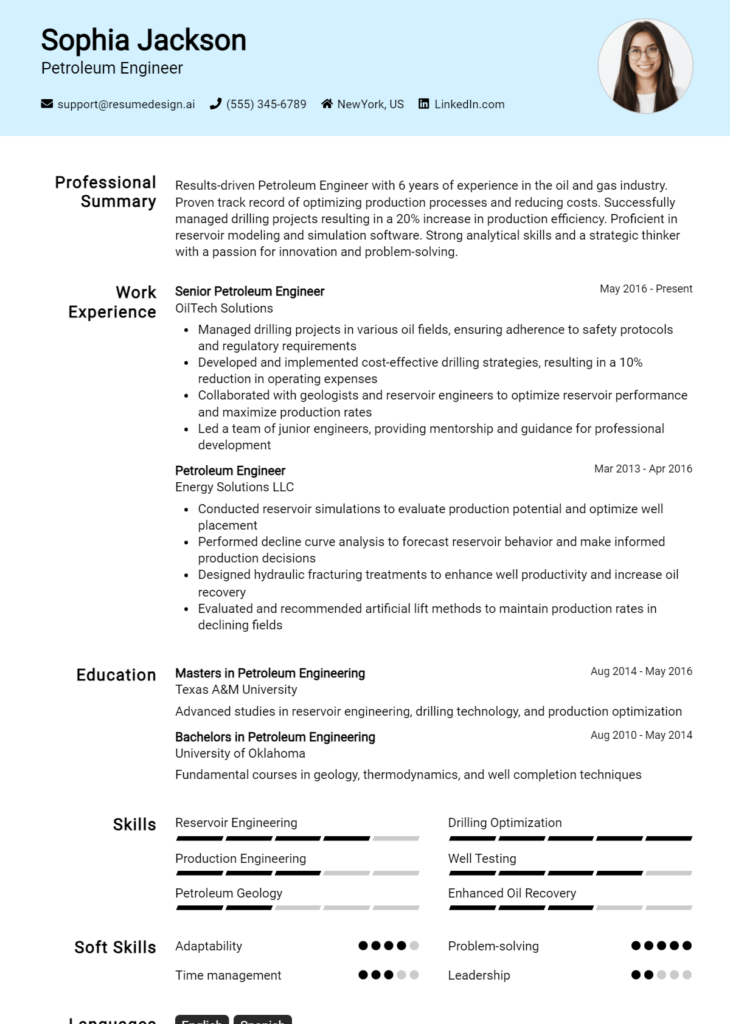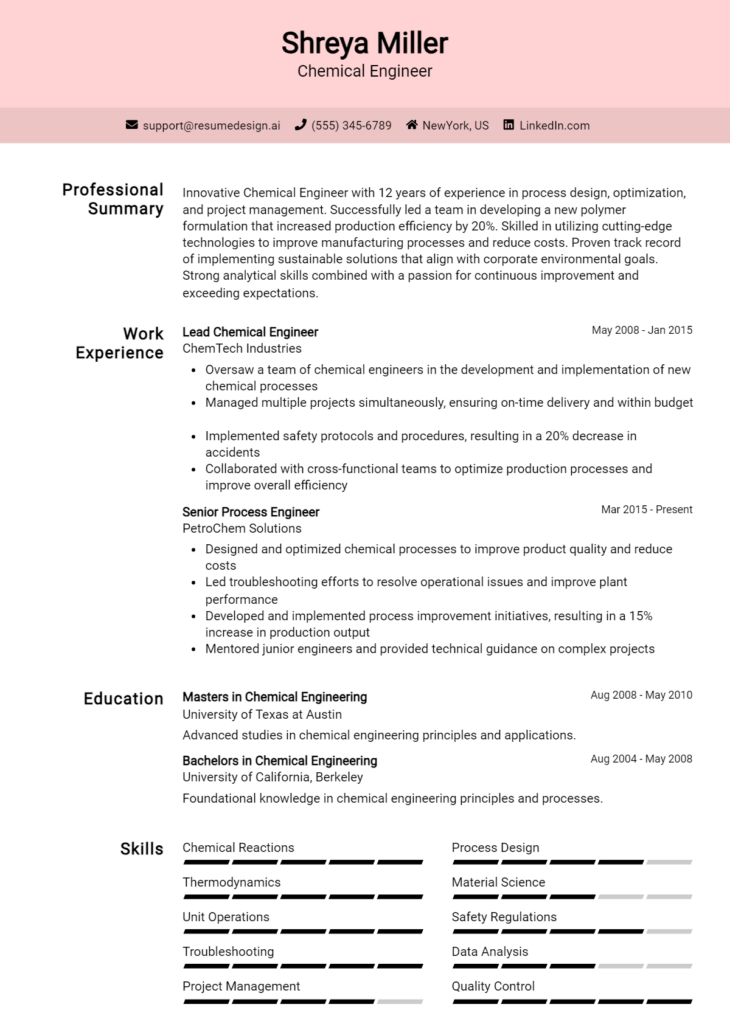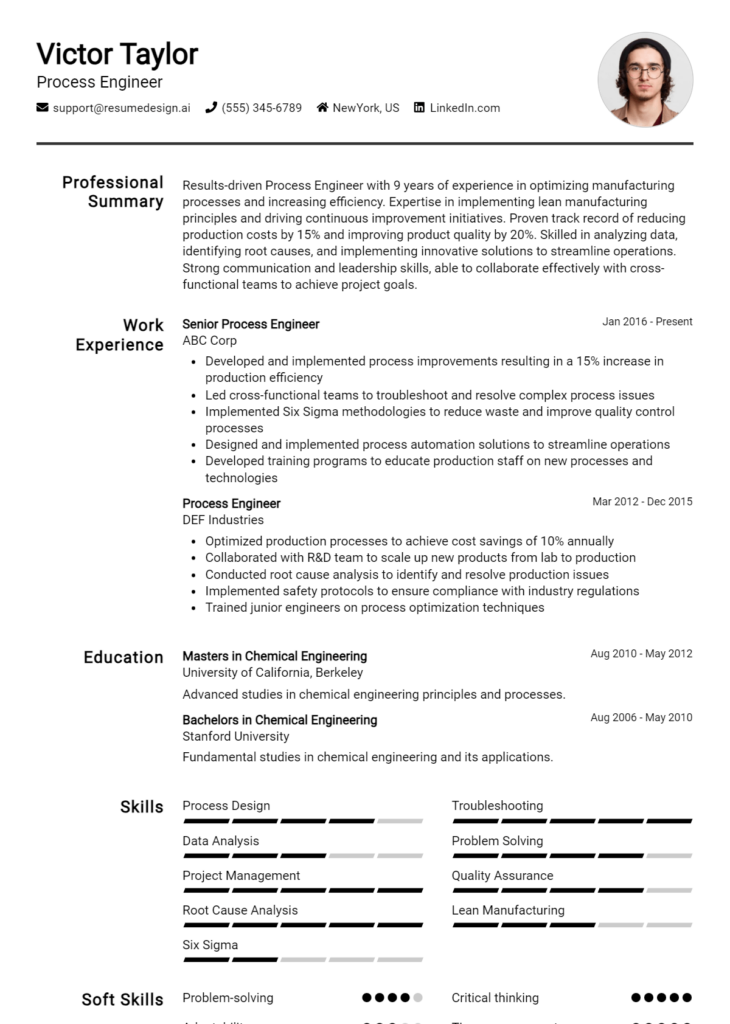Pharmaceutical Engineer Core Responsibilities
Pharmaceutical Engineers play a critical role in the development and production of pharmaceutical products, bridging the gap between research and manufacturing. They are responsible for designing processes, ensuring quality control, and adhering to regulatory standards. Essential skills include technical expertise in engineering principles, operational efficiency, and strong problem-solving abilities. These competencies contribute significantly to the organization's goals, optimizing production while ensuring safety and efficacy. A well-structured resume can effectively highlight these qualifications, showcasing a candidate's potential value to prospective employers.
Common Responsibilities Listed on Pharmaceutical Engineer Resume
- Design and optimize pharmaceutical manufacturing processes.
- Ensure compliance with regulatory standards and quality control procedures.
- Collaborate with cross-functional teams, including R&D and quality assurance.
- Conduct risk assessments and implement corrective actions.
- Analyze production data to identify areas for improvement.
- Develop and validate process scale-up methodologies.
- Provide technical support during equipment installation and maintenance.
- Participate in the development of Standard Operating Procedures (SOPs).
- Monitor and troubleshoot production issues to maintain efficiency.
- Conduct training sessions for team members on new processes and technologies.
- Stay updated on industry trends and advancements in pharmaceutical engineering.
- Contribute to project management and ensure timely delivery of milestones.
High-Level Resume Tips for Pharmaceutical Engineer Professionals
In the competitive field of pharmaceutical engineering, a well-crafted resume serves as your first and often only chance to make a lasting impression on potential employers. A resume is not just a list of your qualifications; it’s a powerful marketing tool that highlights your unique skills, experiences, and achievements. For professionals in this industry, it's crucial to create a document that not only showcases your technical expertise but also reflects your ability to contribute to the success of a pharmaceutical company. In this guide, we will provide practical and actionable resume tips specifically tailored for Pharmaceutical Engineer professionals, ensuring you stand out in a crowded job market.
Top Resume Tips for Pharmaceutical Engineer Professionals
- Tailor your resume to match the specific job description, emphasizing skills and experiences that align with the employer's requirements.
- Showcase relevant experience by detailing your roles in drug development, manufacturing processes, or quality control.
- Quantify your achievements by using numbers and percentages to demonstrate the impact of your work (e.g., “Improved production efficiency by 20%”).
- Highlight industry-specific skills such as knowledge of regulatory compliance, Good Manufacturing Practices (GMP), and quality assurance protocols.
- Use action verbs to convey your contributions effectively, making your resume more dynamic and engaging.
- Include certifications or advanced degrees relevant to pharmaceutical engineering, such as a degree in Chemical Engineering or certifications in Six Sigma.
- Incorporate keywords from the job posting to optimize your resume for applicant tracking systems (ATS).
- Maintain a clean and professional format, ensuring easy readability with organized sections and bullet points.
- Consider adding a summary statement at the top of your resume that encapsulates your career goals and key qualifications.
By implementing these tips, you can significantly enhance your resume and increase your chances of landing a job in the pharmaceutical engineering field. A well-structured resume that effectively showcases your skills and achievements will not only capture the attention of hiring managers but also position you as a strong candidate in a competitive landscape.
Why Resume Headlines & Titles are Important for Pharmaceutical Engineer
In the competitive field of pharmaceutical engineering, a well-crafted resume headline or title serves as the first impression a candidate makes on potential employers. It plays a crucial role in summarizing key qualifications and attracting the attention of hiring managers amidst a sea of applications. A strong headline encapsulates the essence of a candidate's expertise in a concise manner, effectively communicating their value proposition. By being direct and relevant to the specific job being applied for, these headlines can set the tone for the entire resume, compelling hiring professionals to delve deeper into the candidate's qualifications.
Best Practices for Crafting Resume Headlines for Pharmaceutical Engineer
- Keep it concise: Aim for a headline that is brief and to the point, ideally within 10 words.
- Be role-specific: Tailor the headline to reflect the specific position or area of expertise within pharmaceutical engineering.
- Highlight key skills: Incorporate essential skills or certifications that align with the job description.
- Use impactful language: Utilize strong action verbs and descriptive adjectives to create a compelling statement.
- Avoid jargon: Use clear and understandable language that can be easily grasped by hiring managers.
- Include relevant experience: Mention years of experience or significant achievements to establish credibility.
- Showcase your uniqueness: Identify what sets you apart from other candidates in your field.
- Match the job description: Align your headline with the key qualifications and requirements listed in the job posting.
Example Resume Headlines for Pharmaceutical Engineer
Strong Resume Headlines
Innovative Pharmaceutical Engineer with 5+ Years in Drug Development
Certified Quality Engineer Specializing in GMP Compliance
Results-Driven Pharmaceutical Engineer with Expertise in Process Optimization
Experienced Pharmaceutical Engineer Focused on Regulatory Affairs and Quality Control
Weak Resume Headlines
Engineer Looking for a Job
Pharmaceutical Professional
Experienced in Engineering
Strong resume headlines are effective because they clearly communicate the candidate's relevant skills and experiences, immediately drawing in the reader's attention. They provide a snapshot of what the candidate brings to the table, making it easier for hiring managers to assess fit quickly. Conversely, weak headlines fail to make an impact due to their vagueness and lack of specificity, leaving hiring managers unclear about the candidate's qualifications and diminishing their interest in the resume. A compelling headline is essential for standing out in a competitive job market.
Writing an Exceptional Pharmaceutical Engineer Resume Summary
A resume summary is a critical component for a Pharmaceutical Engineer, as it serves as the first impression a hiring manager will have of a candidate. A well-crafted summary quickly captures attention by succinctly showcasing key skills, relevant experience, and notable accomplishments that directly align with the job role. By being concise and impactful, a strong summary can effectively highlight what sets the candidate apart from others, making it essential to tailor this section to the specific job being applied for.
Best Practices for Writing a Pharmaceutical Engineer Resume Summary
- Quantify achievements with specific metrics or outcomes to demonstrate impact.
- Focus on key skills that are relevant to the pharmaceutical engineering field.
- Tailor the summary to match the job description and requirements of the position.
- Use action verbs to convey a sense of proactivity and determination.
- Limit the summary to 3-5 sentences to maintain clarity and conciseness.
- Incorporate industry-specific terminology to showcase expertise and familiarity with the field.
- Highlight unique achievements or experiences that differentiate you from other candidates.
- Maintain a professional tone that reflects your commitment to the industry.
Example Pharmaceutical Engineer Resume Summaries
Strong Resume Summaries
Results-driven Pharmaceutical Engineer with over 8 years of experience in drug formulation and process optimization, achieving a 20% increase in production efficiency and a 15% reduction in costs. Proven expertise in regulatory compliance and cross-functional collaboration, leading successful FDA submissions for three novel drug applications.
Dedicated Pharmaceutical Engineer with a solid background in quality assurance and process validation, overseeing 10+ product launches. Demonstrated ability to enhance product quality through rigorous testing and troubleshooting, resulting in a 30% decrease in product recalls.
Innovative Pharmaceutical Engineer skilled in utilizing lean manufacturing principles to streamline operations. Successfully led a project that improved the cycle time of tablet production by 25% while maintaining compliance with ISO 9001 standards.
Weak Resume Summaries
Pharmaceutical Engineer with experience in various tasks. Looking for a job in a reputable company.
An engineer with a background in pharmaceuticals and some knowledge of the industry. Seeking opportunities to grow and learn.
The examples of strong resume summaries are considered effective because they include quantifiable results, specific skills, and direct relevance to the role, showcasing the candidate's impact and expertise. In contrast, the weak summaries lack detail and specificity, making them appear generic and failing to convey the candidate's qualifications or accomplishments, which can lead to missed opportunities in the competitive pharmaceutical engineering field.
Work Experience Section for Pharmaceutical Engineer Resume
The work experience section of a Pharmaceutical Engineer resume is critical as it serves to demonstrate the candidate's practical application of technical skills within the pharmaceutical industry. This section not only highlights the candidate's ability to manage teams and collaborate effectively but also illustrates their capability to deliver high-quality products that meet stringent regulatory standards. By quantifying achievements and aligning past experiences with industry benchmarks, candidates can effectively convey their value to potential employers and stand out in a competitive job market.
Best Practices for Pharmaceutical Engineer Work Experience
- Clearly articulate technical skills relevant to pharmaceutical engineering, such as process optimization and quality control.
- Quantify achievements with specific metrics, such as percentage improvements in yield or reduction in production time.
- Highlight leadership roles in team projects, emphasizing collaborative efforts and successful outcomes.
- Use industry-standard terminology to align your experience with current trends and practices in pharmaceuticals.
- Focus on results-driven narratives that demonstrate your impact on product development or regulatory compliance.
- Incorporate examples of problem-solving in high-pressure situations to showcase critical thinking skills.
- Tailor your experience to the job description to ensure relevance and alignment with the employer's needs.
- Utilize action verbs to convey a sense of initiative and ownership in your contributions.
Example Work Experiences for Pharmaceutical Engineer
Strong Experiences
- Led a cross-functional team to redesign a key production process, resulting in a 30% increase in efficiency and a 15% reduction in costs.
- Implemented a new quality control protocol that decreased product defects by 25%, significantly improving customer satisfaction ratings.
- Managed the successful scale-up of a novel drug formulation from pilot to commercial production, achieving compliance with FDA regulations on the first submission.
- Collaborated with R&D to develop a new drug delivery system, leading to a 40% faster time-to-market compared to previous projects.
Weak Experiences
- Worked on various projects in the pharmaceutical industry.
- Assisted in quality control tasks and helped the team achieve goals.
- Involved in the production process for multiple products.
- Participated in team meetings and contributed ideas.
The examples labeled as strong experience are considered impactful because they provide specific, quantifiable achievements that clearly demonstrate the candidate's technical expertise, leadership abilities, and collaborative success. In contrast, the weak experiences lack detail and measurable outcomes, making it difficult for potential employers to gauge the candidate's contributions or skills. Strong experiences are action-oriented and results-driven, while weak experiences come across as vague and uninspiring.
Education and Certifications Section for Pharmaceutical Engineer Resume
The education and certifications section of a Pharmaceutical Engineer resume is crucial for showcasing the candidate's academic background, industry-relevant certifications, and commitment to continuous learning. This section not only provides potential employers with insight into the candidate's qualifications but also highlights their dedication to staying current in a rapidly evolving field. By including relevant coursework, certifications, and specialized training, candidates can significantly enhance their credibility and demonstrate a strong alignment with the job requirements, setting themselves apart from other applicants.
Best Practices for Pharmaceutical Engineer Education and Certifications
- Include degrees relevant to pharmaceutical engineering, such as a Bachelor’s or Master’s in Chemical Engineering, Pharmaceutical Sciences, or Biotechnology.
- List industry-recognized certifications, such as Certified Pharmaceutical Industry Professional (CPIP) or Six Sigma Green Belt.
- Highlight relevant coursework that pertains to drug development, regulatory affairs, and quality assurance.
- Provide details on specialized training programs or workshops that enhance technical skills.
- Use clear formatting to distinguish between degrees, certifications, and professional development.
- Prioritize recent and relevant qualifications to showcase ongoing education and adaptability.
- Tailor the education and certifications section to align with the specific job description and requirements.
- Avoid including high school diplomas if higher education has been completed; focus on advanced degrees and certifications.
Example Education and Certifications for Pharmaceutical Engineer
Strong Examples
- Bachelor of Science in Chemical Engineering, University of XYZ, 2018
- Certified Pharmaceutical Industry Professional (CPIP), 2021
- Master of Science in Pharmaceutical Sciences, University of ABC, 2020
- Completed coursework in Drug Formulation and Process Development, 2019
Weak Examples
- Bachelor of Arts in History, University of DEF, 2015
- Certification in Basic First Aid, 2022
- Diploma in Computer Applications, 2017
- Completed a general education course on Public Speaking, 2020
The examples provided highlight the importance of relevance and specificity in the education and certifications section. Strong examples reflect degrees and certifications that are directly applicable to the field of pharmaceutical engineering, showcasing the candidate's qualifications and expertise. In contrast, weak examples include unrelated degrees and certifications that do not enhance the candidate's profile for a pharmaceutical engineering role, potentially leading to a lack of credibility and poor alignment with industry expectations.
Top Skills & Keywords for Pharmaceutical Engineer Resume
In the competitive field of pharmaceutical engineering, a well-crafted resume is essential to stand out among candidates. Highlighting relevant skills not only showcases your qualifications but also demonstrates your ability to contribute effectively to the industry. Both hard and soft skills play a crucial role in a Pharmaceutical Engineer's resume, as they reflect a blend of technical expertise and interpersonal abilities. While hard skills indicate your specific knowledge in areas like process development and regulatory compliance, soft skills encompass your capacity for teamwork, communication, and problem-solving. Together, these skills can significantly enhance your appeal to potential employers and increase your chances of securing an interview.
Top Hard & Soft Skills for Pharmaceutical Engineer
Soft Skills
- Communication
- Teamwork
- Problem-solving
- Attention to detail
- Time management
- Adaptability
- Critical thinking
- Leadership
- Project management
- Creativity
Hard Skills
- Process engineering
- Regulatory compliance
- Quality control and assurance
- Analytical chemistry
- Biopharmaceuticals
- Equipment validation
- Process optimization
- Data analysis and interpretation
- Good Manufacturing Practices (GMP)
- Laboratory techniques
For further guidance on how to effectively incorporate skills and work experience into your resume, consider exploring additional resources that can help enhance your job application.
Stand Out with a Winning Pharmaceutical Engineer Cover Letter
Dear [Hiring Manager's Name],
I am writing to express my interest in the Pharmaceutical Engineer position at [Company Name] as advertised on [where you found the job listing]. With a solid background in pharmaceutical engineering and a passion for innovation in drug development, I am confident in my ability to contribute effectively to your team. My expertise in process optimization and quality assurance, combined with my strong analytical skills, positions me uniquely to help [Company Name] achieve its ambitious goals in delivering safe and effective medications.
In my previous role at [Previous Company Name], I successfully led a cross-functional team to enhance the manufacturing process of a critical drug formulation. By implementing Lean Six Sigma methodologies, we were able to reduce production cycle time by 25% and improve product yield by 15%. My hands-on experience with both upstream and downstream processes, along with my proficiency in regulatory compliance, has equipped me with the skills necessary to navigate the complexities of pharmaceutical production while ensuring adherence to industry standards.
I am particularly drawn to the mission of [Company Name], which emphasizes innovation and patient-centered solutions. I am excited about the opportunity to work alongside talented professionals who share my commitment to improving healthcare outcomes. I am eager to bring my expertise in process engineering and my dedication to quality assurance to [Company Name], contributing to the development of groundbreaking therapies that can make a real difference in patients' lives.
Thank you for considering my application. I look forward to the opportunity to discuss how my background, skills, and enthusiasms align with the goals of [Company Name]. I am excited about the possibility of contributing to your team and helping to drive forward your innovative projects.
Sincerely,
[Your Name]
[Your Phone Number]
[Your Email Address]
Common Mistakes to Avoid in a Pharmaceutical Engineer Resume
When crafting a resume for a Pharmaceutical Engineer position, it's crucial to present your qualifications and experiences effectively. However, many candidates make common mistakes that can hinder their chances of landing an interview. These pitfalls can range from formatting issues to failing to highlight relevant skills, ultimately leading to a less impactful resume. To help you create a compelling application, here are some common mistakes to avoid:
Neglecting Keywords: Failing to include industry-specific keywords can make your resume less likely to pass through Applicant Tracking Systems (ATS), which many companies use to filter candidates.
Overly Generalized Objectives: Using a vague objective statement can detract from your resume. Tailoring your objective to reflect your specific aspirations and how they align with the company’s goals is essential.
Lack of Quantifiable Achievements: Simply listing job duties without quantifiable results can make your contributions seem less significant. Including measurable outcomes demonstrates your impact and effectiveness.
Ignoring Technical Skills: Pharmaceutical engineering requires a specific skill set. Omitting key technical skills, such as knowledge of regulatory compliance, process validation, or equipment handling, can undermine your qualifications.
Inconsistent Formatting: A cluttered or inconsistent format can make your resume difficult to read. Using a clean, professional layout with uniform fonts and spacing enhances readability and professionalism.
Excessive Length: A resume that is too long can overwhelm recruiters. Aim for a concise, one to two-page document that highlights your most relevant experiences and skills.
Not Tailoring for Each Application: Sending the same resume for every job application can be detrimental. Tailoring your resume to highlight the most relevant experiences and skills for each position shows genuine interest and effort.
Neglecting Soft Skills: While technical expertise is critical, soft skills such as teamwork, communication, and problem-solving are equally important in pharmaceutical engineering roles. Failing to highlight these can leave a gap in your profile.
Conclusion
As a Pharmaceutical Engineer, your role is pivotal in the development and production of medications that meet rigorous safety and efficacy standards. Throughout this article, we explored the essential skills required for success in this field, including proficiency in chemistry, engineering principles, and regulatory knowledge. We also discussed the importance of collaboration within multidisciplinary teams and the ability to adapt to new technologies and processes.
In conclusion, it’s crucial to ensure that your resume effectively reflects these skills and experiences. A well-crafted resume can set you apart in a competitive job market. We encourage you to take the time to review and update your Pharmaceutical Engineer resume to highlight your qualifications and achievements.
To assist you in this process, consider utilizing the following resources:
- Resume templates to find a layout that suits your style.
- Resume builder for an easy-to-use platform to create your resume from scratch.
- Resume examples for inspiration on how to present your experience effectively.
- Cover letter templates to complement your resume and provide a comprehensive view of your candidacy.
Take action now and ensure your resume stands out to potential employers in the pharmaceutical industry!

